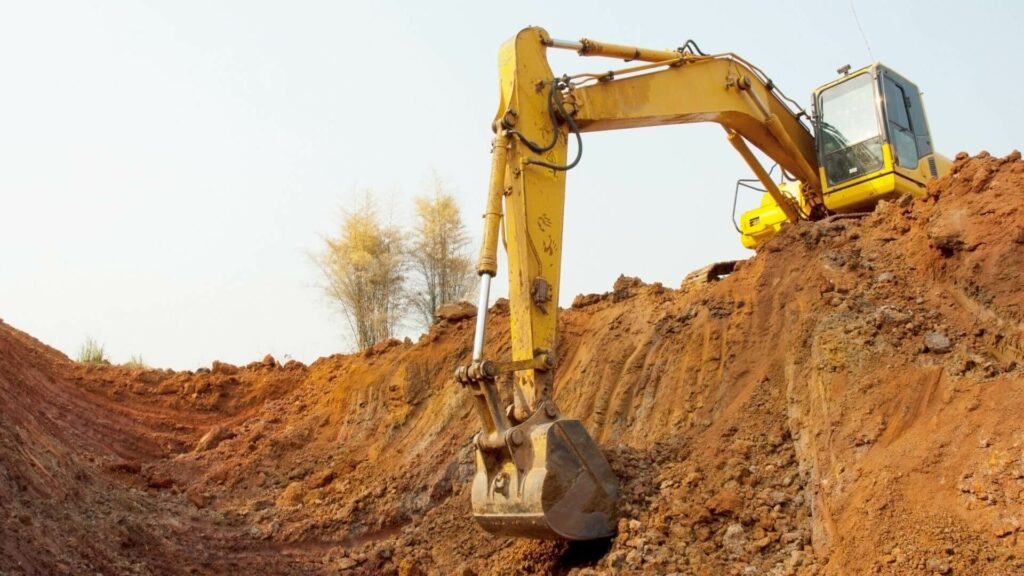
Key Takeaways
- Excavators are used in various industries including construction, mining, forestry, demolition, and environmental management.
- Their versatility allows them to perform a wide range of tasks efficiently.
- Technological advancements are making it more efficient and environmentally friendly.
- Proper management is necessary to mitigate environmental impacts.
These are heavy machinery marvels that play a crucial role in various industries. From construction to forestry, these versatile machines are indispensable. But what exactly are they used for?
This article explores the diverse applications of excavators, offering insights into their multifunctional nature and how they contribute to different sectors.
Understanding Excavators
These are large, tracked or wheeled machines equipped with a boom, dipper (or stick), bucket, and cab. They are designed to dig, move, and place materials, making them essential tools in many operations.
Their ability to rotate 360 degrees and their various attachments make them adaptable to numerous tasks.
Key Components of an Excavator
- Boom: The long arm that extends from the machine and supports the bucket.
- Dipper (Stick): The part that connects the bucket to the boom and allows for precise movement.
- Bucket: The attachment used for digging and moving materials.
- Cab: The operator’s station where the controls are located.
What Are Excavators Used For?
Excavators have a wide range of uses across various industries. Here’s a closer look at some of their most common applications:
1. Construction
In construction, excavators are indispensable for tasks such as digging trenches, foundations, and landscaping. They can efficiently remove large amounts of earth, making site preparation faster and more effective.
For example, excavators are used to dig foundations for buildings, prepare sites for roads, and even handle demolition tasks.
2. Mining
Excavators are crucial in mining operations, where they are used to extract minerals and ore from the earth. They can handle large volumes of material, making them ideal for both surface and underground mining.
For instance, they are used to remove overburden (the top layer of soil and rock) to expose valuable minerals.
3. Forestry
In forestry, excavators are employed for clearing land, removing stumps, and managing vegetation. They can be equipped with specialized attachments like grapples and mulchers to handle tree removal and land clearing efficiently.
This helps prepare the land for new growth or development projects.
4. Demolition
In demolition projects, workers also use excavators to dismantle structures. They can fit them with hydraulic hammers, shears, or other attachments to break down buildings and other large structures.
Their ability to operate in confined spaces and their powerful tools make them ideal for controlled demolition.
5. Environmental Management
Excavators play a role in environmental management tasks such as erosion control, wetland restoration, and disaster response. You can use them to dig retention ponds, remove debris from natural disasters, and assist in habitat restoration efforts.
Implications and Broader Impact
The versatility of excavators means they are central to many industries, each benefiting from their ability to perform diverse tasks efficiently. Their role extends beyond mere excavation; they contribute to the economy by enabling infrastructure development, natural resource extraction, and environmental conservation.
Economic Impact
Excavators enhance productivity and reduce labor costs by performing tasks that would otherwise require extensive manual labor. This efficiency translates into cost savings and faster project completion times, impacting industries positively by reducing overall project expenses.
Environmental Considerations
While excavators offer numerous benefits, managing their use carefully is necessary to minimize environmental impact. For instance, construction and mining activities can lead to habitat disruption and soil erosion.
Proper planning and use of excavators can mitigate these effects, such as by using erosion control measures and responsible land management practices.
Insights and Perspectives
While excavators are incredibly versatile, it’s essential to consider their operational and environmental impacts. Advances in technology are leading to more efficient and environmentally friendly models, such as those with lower emissions or hybrid engines.
Technological Innovations
Recent innovations in excavator technology include improvements in fuel efficiency, automation, and remote control capabilities. These advancements help increase productivity and reduce the environmental footprint of excavation activities.
Counterarguments
Some argue that the reliance on heavy machinery can lead to over-dependence on equipment, potentially reducing the skill level of manual laborers. However, the benefits of using excavators, such as enhanced efficiency and safety, generally outweigh these concerns.
For expert solutions in land clearing and forestry, Ace Pro Forestry in Conyers, GA, is your go-to resource. Our team is ready to assist, whether you’re curious about what excavators are used for or need professional help with excavation and land management.
Reach out to us at 770-501-6201 for reliable services tailored to your needs. We specialize in leveraging the versatility of excavators to handle a wide range of tasks, ensuring your project runs smoothly and efficiently.
Conclusion
Excavators are among the most versatile machines in heavy equipment, with applications spanning construction, mining, forestry, demolition, and environmental management. Industries can leverage the capabilities of excavators effectively by understanding what they are used for, while considering their environmental and economic impacts.
Are you considering a project that requires the use of excavators? Discover how our expertise can help you with your excavation needs. Contact Ace Pro Forestry to learn more about what excavators are used for and how we can assist you.
FAQs
1. What types of tasks can excavators perform?
Excavators can dig, move, and place materials, handle demolition, clear land, and assist in environmental management.
2. How do excavators impact the economy?
Excavators improve productivity, reduce labor costs, and speed up project completion, leading to cost savings and economic benefits.
3. Are there environmental concerns with using excavators?
Yes, but proper planning and use can minimize negative impacts such as habitat disruption and soil erosion.
4. What are the latest advancements in excavator technology?
Advancements include improved fuel efficiency, automation, and remote control capabilities.
5. How can I determine if an excavator is right for my project?
Consult with professionals to assess your project needs and determine the most suitable excavator and attachments.


